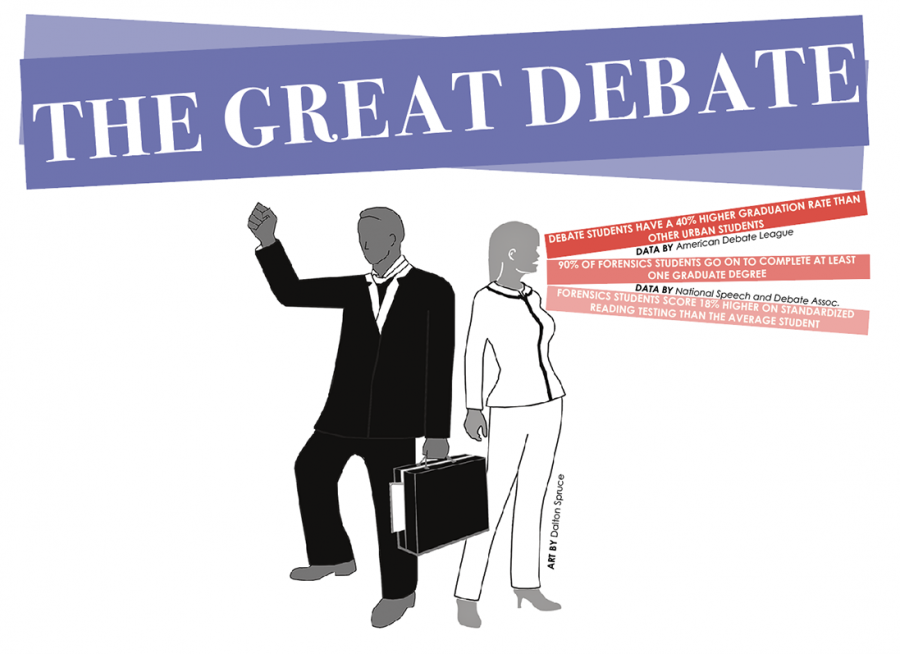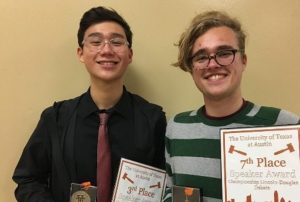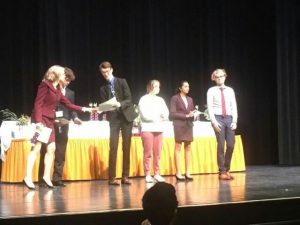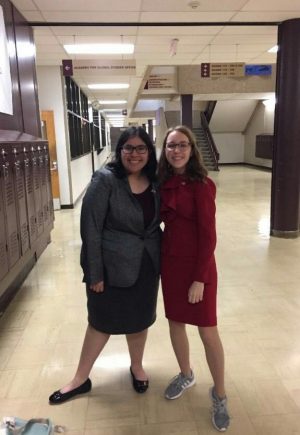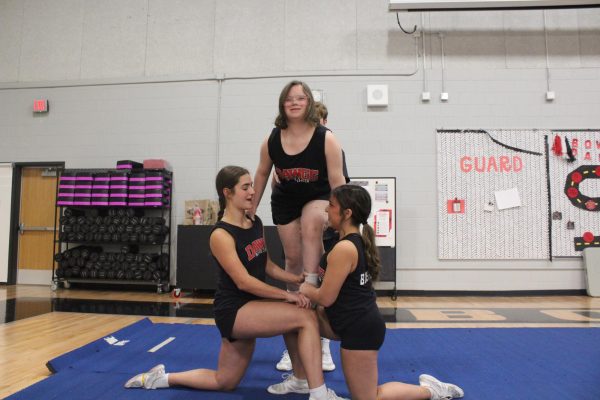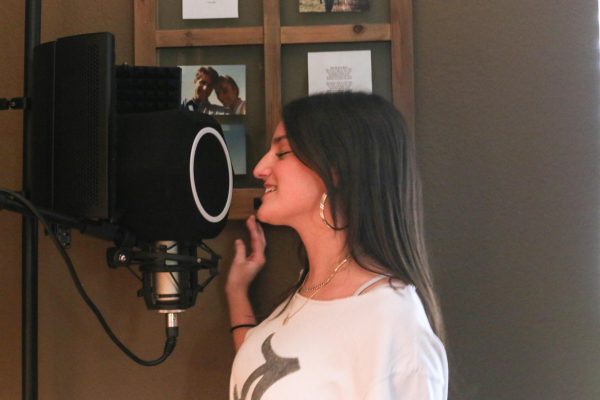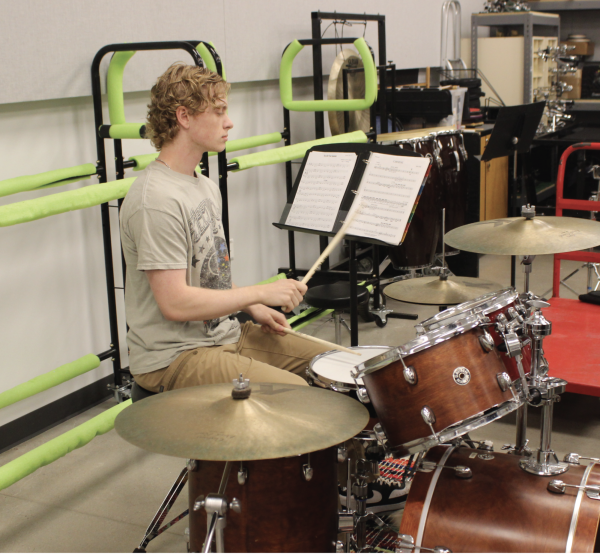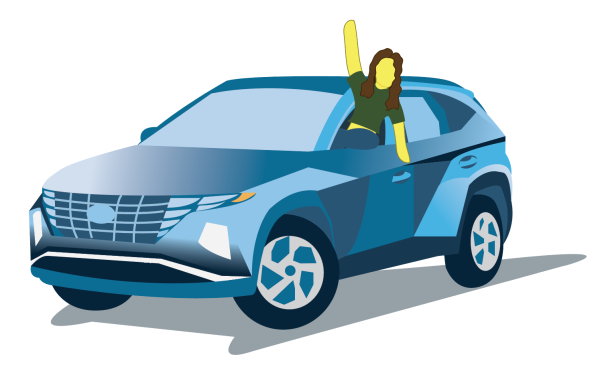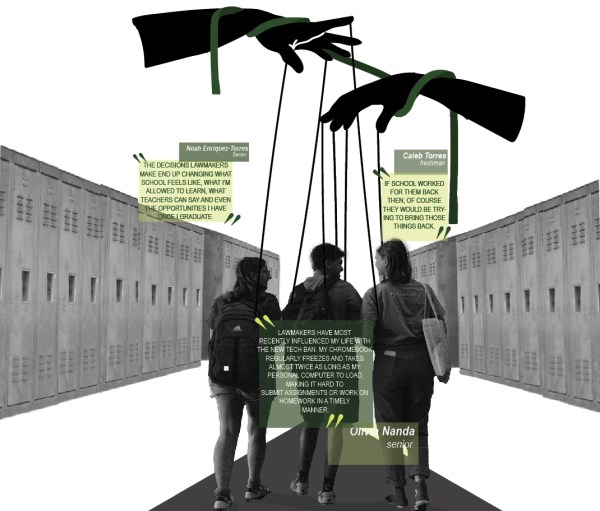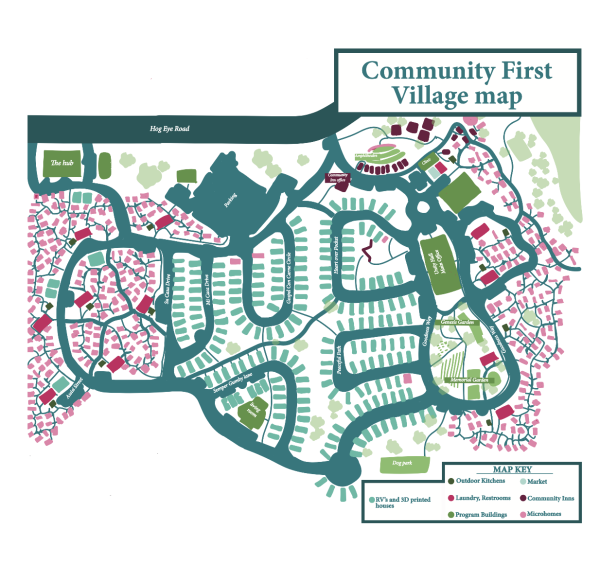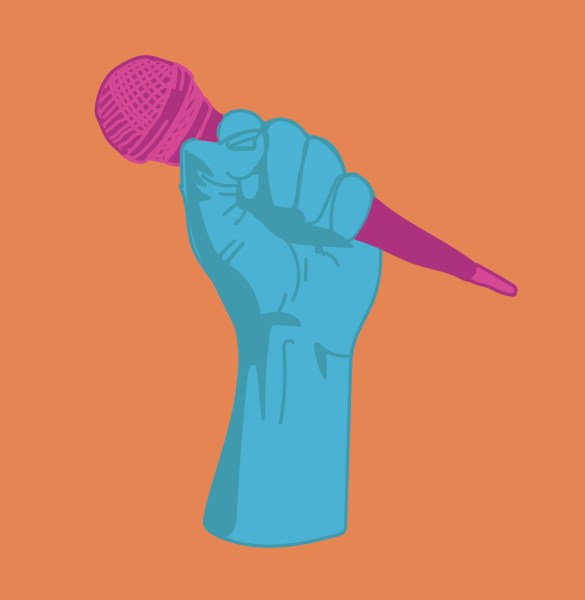The Great Debate
Debate students have tournaments, they rehearse and prepare, and now the Dispatch is taking a closer look at the inner workings of the Bowie forensics department.
Across Austin, thousands of alarm clocks rip students from their beds at five in the morning on a Saturday, each of whom wrestles into suits before stumbling to their car to drive to the school hosting the tournament. It’s going to be a long day for the speech and debate department.
Composed of 25 oral interpretation students and 90 speech and debate students, including novices, the Bowie forensics department spends all year preparing for weekly tournaments to compete against other schools in their events.
“There is really kind of three groups,” debate teacher John Mast said. “There’s debate, which is usually two teams against each other, and then there’s public speaking, which is like you’re competing against other people but not in the same way, and then oral interpretation is usually interpretation of literature, like books, plays, music, [or] songs.”
However, many students are unaware of the differences of speech in comparison to debate.
“A lot of people think that we give speeches, which is more on the debate side of our program,” sophomore Alyssa Shumaker said. “In addition, occasionally someone will see the name ‘forensics’ used, which is really just another name for speech and debate, and think of like CSI criminal science sort of things, which is definitely not what we do.”
Instead, speech focuses on events such as oral interpretation, which is a ten-minute acting piece performed by one or two individuals.
“Interp is an amazing opportunity because you don’t have to wait for someone else to give you a chance,” senior Luke Evans said. “It’s your own stage and you can try pretty much whatever you want and get some mostly objective feedback from a random person who doesn’t care about your feelings or being too harsh, which kind of sounds awful but it has been an incredible tool for me to use as an actor and has largely been why I still love performing.”
While tournaments foster skills for all participants, students in theatre in particular are able to gain experience in the audition process.
“The benefit of speech and debate is that you’re auditioning every weekend, so you get feedback constantly and they start to kind of be more aware of how they’re presenting themselves,” speech teacher Marco Bazan said.
In the weeks and days leading up to the tournament, students must devote time to developing the materials for their event(s).
“Preparing for a tournament starts with deciding what events to compete in and then searching for literature,” Shumaker said. “Once you find your book, play, poem, musical, or other piece, you start cutting it. Cutting a piece consists of searching through your source for the scenes or pages you want to include and combining them in a way that works for your event. Next it’s memorization and blocking, as well as feedback from other members of the team. After that, you’re pretty much ready to go.”
Since performing in front of judges requires complete confidence in the piece, students spend time in and out of class rehearsing.
“You never entirely get over the feeling of nervousness you get before a tournament, especially the early ones, but you learn to love the feeling of anticipation and it becomes a really unique kind of adrenaline high that is pretty great,” Evans said. “It also helps improve your speaking skills because once you’re there, you can do absolutely nothing about the fact that you will have to perform so you just have to kind of realize everyone is nervous and go for it.”
These public speaking skills are also applied in debate.
“I do Congressional Debate, so, just like the real Congress, we prepare pieces of legislation,” senior Amy Shreeve said. “We get thirty bills per semester. They pertain either to foreign policy or domestic policy. To prepare these, I usually do some targeted Google searches to get an idea of the topic, decide the side I’m going to take, and then do substantive research (from law journals and theses) to back up my claims. A lot of the preparation I do is mental—I practice so I don’t get nervous, and I prepare outfits to hype myself up.”
Due to the length of the tournaments, students often grow closer with their teammates.
“Spending up to 12 hours with the people on the team at tournaments has helped me get much closer to everyone on the team since there are often a few hours between rounds where the team just sits in the cafeteria talking,” sophomore Kaia Pierce said. “You tend to learn a lot about a person when they are running on four hours of sleep.”
Students in Debate 1 are required to participate in two tournaments over the course of the school year and those in Debate 2-4 must do five, and both groups are required to help host the Bowie tournament. However, many choose to compete more regularly.
“A typical tournament: I wake up around six and get into my suit,” Shreeve said. “We go to another high school. First, I do my secondary events, Extemporaneous Speaking and Original Oratory. We have two rounds of these usually. Then, we have a three-hour Congress preliminary round. If I’m lucky, I’ll have a semifinal round of [Original Oratory] and Extemp, then there’s a two hour Congress final. Then is Extemp and [Original Oratory] finals. There isn’t a lot of free time if I do three events, but my favorite parts of tournaments are spending time with my team. Then, there is an awards ceremony and we go home. Frequently, we’ll have team dinners after.”
Many events in debate require prior knowledge, which students must know ahead of time as the internet is not allowed to be used during events.
“I spend every living second of my life researching and preparing for debate,” sophomore Nick Van Lente said. “I use the hell out of my New York Times subscription. Keeping caught up helps me be more aware of important things in society and strengthens the power I have as a US citizen—information is power. Also, being fluent in politics is a great way to flex on relatives at Christmas and Thanksgiving.”
In context of today’s growing political polarization, Mast stresses the importance of a safe environment to practice generating civil debate.
“The problem is that we kind of get stuck in our own [perspectives] and if we only hear that version of things then it gets reinforced, so hearing people from all sides of the spectrum is critical,” Mast said. “The other thing is being willing to take the other side—it kind of separates your feelings from the ideas, which is often what drives a lot of the conflict that happens. I would argue in today’s atmosphere right now that being able to separate emotionally from those is probably pretty critical for creating that civil discussion that is necessary for cooperation.”
According to Mast, debate also teaches students critical reading analysis skills, efficient note taking (or flowing), and how to advocate for oneself.
“Debate has literally been the most useful thing I’ve learned from public American schooling,” Van Lente said. “Debate keeps me aware of what’s actually happening in the world, it allows me to eloquently present my view on something, and being able to confidently speak in public is a skill virtually every profession uses.”
Furthermore, while the forensics process can be challenging, learning how to express views and apply speaking skills to real issues has ultimately let students confront their own identities and prepare for the world around them.
“When the topic is controversial, it’s typically pretty easy to coward and hide my emotions, but one of the few things I’ve come to learn is that being the unapologetic version of myself is always the one that feels and speaks my truth,” Van Lente said. “Letting myself conceal or conserve my personality is a form of fear, and stepping out and being vulnerable and raw never ceases to shine.”
Your donation will support the student journalists of James Bowie High School. Your contribution will help cover our annual website hosting costs. Any contributions made through this service are NOT tax deductible. If you would like to make a tax deductible donation OR to subscribe to our print edition, please contact us at [email protected].


